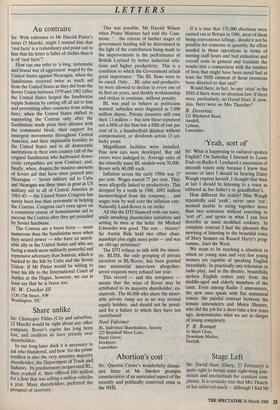Share unlike
Sir: Christoper Fildes (City and suburban, 12 March) would be right about any other company. Rover's equity has long been lost, and creditors do have priority over shareholders. In our long-lame duck it is necessary to ask who blundered, and how: for the prime creditor is also the very assertive majority shareholder, the Department of Trade and Industry. Its predecessors perpetrated BL, then crashed it, then offered £60 million for a firm that was selling a million vehicles a year. Many shareholders preferred the prospect of recovery. This was possible. Mr Harold Wilson when Prime Minister had told the Com- mons: the release of further stages of government funding will be determined in the light of the contribution being made to the improvements in the performance of British Leyland by better industrial rela- tions and higher productivity. This is a condition to which the Government attach great importance.' The BL flaws were to be cured. Only... BL sales and productiv- ity were allowed to decline in every one of its first six years, and shoddy workmanship and strikes to continue, without penalty.
BL was paid to behave as politicians wanted; subsidies were disguised as 5,000 million shares. Private investors still own their 13 million — but now these represent not a fifth of the firm but a fifth of one per cent of it, a hundredfold dilution without compensation, or dividends across 13 un- lucky years.
Magnificent facilities were installed. Fine new cars were developed. But old errors were indulged in. Average sales of the absurdly many BL models were 70,000. Rover sells 60,000 each.
Inflation across the early 1980s was 37 per cent. Wages soared 77 per cent. They were allegedly linked to productivity. This dropped by a tenth in 1986, £892 million haemorrhaged from the company ... and wages rose by well over the inflation rate. Naturally Land-Rover is on strike.
All this the DTI financed with our taxes, while smashing shareholder initiatives and setting its men at the helm. Sir Michael Edwardes was good. The rest ... bizarre? Sir Austin Bide held two other chair- manships plus eight more posts — and was an old-age pensioner!
The DTI refuses to talk with the minor- ity. BLISS, the only grouping of private investors in BL/Rover, has been granted two ministerial interviews altogether; seven requests were refused last year.
This record — and this arrogance means that the woes of Rover may be attributed to its majority shareholder, ex- clusively. The 60,000 who share the miser- able private rump are in no way normal equity holders, and should not be penal- ised for a failure to which they have not contributed.
Noel Falconer
BL Individual Shareholders, Society 223 Bramhall Moor Lane, Hazel Grove, Stockport, Lancashire


















































 Previous page
Previous page